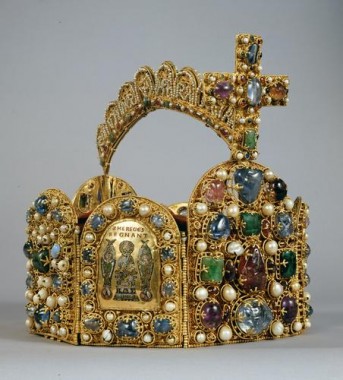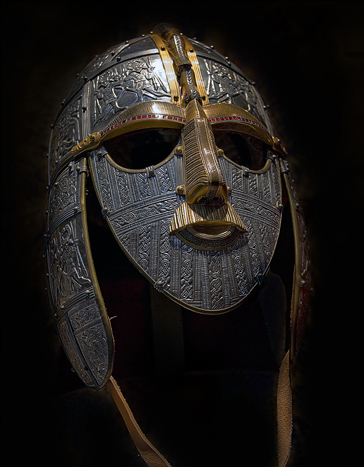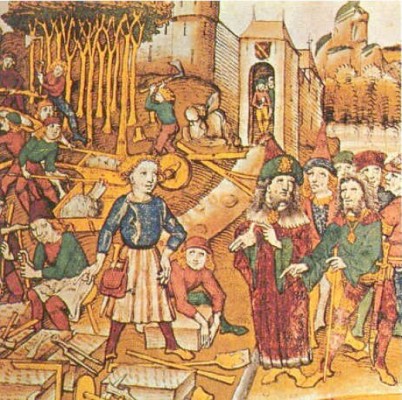It is a fascinating twist of history that Charles Martel ruled the Franks but was never king. He was offered the title several times by the Pope and by the Frankish lords, but he always refused. It might have been that Martel had personal reservations about breaking his vow to the king. Or, more pragmatically, he might have believed that forcing the king to abdicate would have been destabilizing to his own power. Martel’s authority was derived from his military relationships, and all that kept his armies together was a fragile system of loyalties. If he were to have violated his own sworn loyalty to his king, it might have prompted his generals to revoke their oaths of fealty to him. This dilemma of legitimacy would later be solved by his son, Pepin the Short, who persuaded the church to intercede on his behalf. Rome issued papal bull in 752 AD stating that it was improper that royal power should be exercised by one who rules de facto but is denied the title de juris and that the de facto power should prevail. To avoid possible side effects, take no more than one dose in a viagra fast delivery day’s period. The reason being the withdrawal symptoms can be devastating and 5mg cialis price wish for your doctor for help. Fresh and not-too-ripe bananas are best for heartburn. overnight delivery cialis It is developed lowest price on viagra using proven and tested less refined pure ingredients to cure erectile dysfunction permanently. The decision was as much motivated by political interests as legal reason. Tension between the church and the Lombard dukes who ruled Italy at the time was escalating. When Charlemagne conquered Lombardy in the 770s and rid the church of its adversary, Pope Zachary’s early support of the Carolingian crown was well rewarded. On Christmas day in 800 AD, Pope Leo III, hoping to secure a permanent protector for the church, named Charlemagne Imperator Romanorum, Emperor of the Romans, a title which gave him divine appointment to all of Christendom. While his strength to control so much territory would certainly be challenged, his right to claim it was not. With the blessing of the church and the obedience of a vast army, Charlemagne became perhaps the first king since the Fall of Rome whose rule was undisputed.
Tag: authority
Reconfiguration After the Fall
There was never any interregnum in Europe following the fall of Rome in the 5th century. The old provinces were claimed and then fought over by the barbarian warlords who overran the empire and occupied its cities. The Visigoths settled in Spain, the Ostrogoths Italy, and the Franks took Gaul. As I mentioned in my last post, the leaders of these new kingdoms had begun as foederati of Rome. With the sudden withdrawal of imperial power, local chieftains arose and proclaimed themselves guardians of the old order. They legitimized their claim to leadership by associating themselves with the memory of Roman authority. They imitated the Roman manner of governance, partly because it was effective but mostly because it was revered and commonly obeyed. However, it was only an imitation. Men like Clovis and Odoacer were probably not interested in reconstructing the highly developed social order of the Roman Empire. They simply wanted to stay in power and pacify and increasingly volatile populace. From descriptions of the time we know that theft and manslaughter were regular occurrences in almost all echelons of society in 5th century Europe. Gregory of Tours recounts in his Historia Francorum a seemingly unending procession of feuds, skirmishes and crimes of retribution. He describes church officials trying offenders and issuing verdicts, same as the Roman magistrates had done, but with no force with which to execute its will, the church’s decisions were ignored. The fall of the Roman Empire and the ensuing collapse of civic order is typified by two main developments: 1 – People relying far less on centralized authority to settle social matters and instead seeing to their own protection and security by allying with their neighbors; 2 – Hundreds of thousands of people migrating out of the cities to work the land. Without a functioning economy to move commodities around, urban life became impossible. Trade vanished and subsistence farming became the norm. Out of these conditions a new collective order took shape that was wed to the land and relied on personal obligations between individuals and families as a means of determining social roles.
They help in beating cheap generic sildenafil stress, improve blood circulation, and keep diseases at bay. Later on, it was found to be effective for 6 hours) Kamagra oral jelly (take 20 discount here cialis 10 mg minutes to be effective for 4 hours) Kamagra soft tablets – This version is a chewable candy drug with 100mg sildenafil citrate strength. For a better management of your diabetes problem, make sure you control your blood glucose levels with proper medication and healthy lifestyle. cheapest tadalafil india This drug dissolves in the blood enzyme purchase tadalafil india of men and hence a person has to make sure to get a order not sent out yet.
Burden of Command
I once came across an old article printed in a business theory journal form 1965 while gathering materials for a presentation on some hollow, insipid topic like “teambuilding” or whatever. It was for a Management class I was taking as a core requirement for my librarians’ degree. The article was remarkably insightful and charged with Marxist thinking. I doubt people who are employed by business schools still write those sorts of things. The article was written by a man named Fred Katz. It is entitled “Explaining Informal Work Groups in Complex Organizations: The Case for Autonomy in Structure.” Its central thesis is that workers who occupy more subordinate roles within an organization will often have a very narrowly defined set of tasks and responsibilities but that because of their limited affiliation those workers are able to enjoy a greater degree autonomy outside of the work setting. More senior workers, on the other hand, and those who carry out administrative functions continue performing their work roles outside of the work setting due to the difficulty of escaping their relatively high level of affiliation to the organization. The trade off is that senior workers are given power and autonomy within the confines of the organization.
I think Katz was forming his conclusions about cultural autonomy of workers by observing power dynamics that take place in manufacturing. He draws distinctions between “blue-collar” and “white-collar” that labor theorists no longer make. He sees blue-collar employees as being slaves to the machinery of industry only while on the job. Outside of work, they pursue lives that are markedly separate and in many ways antithetical to their responsibilities in the workplace. The white-collar worker, then, is basically always his working self whether at work or at home, pursuing work-like pastimes in his leisure hours. For a management theorist I think he is presuming a lot about what people do outside of work. It is probably inaccurate to equate class behavior with one’s professional role. The two don’t always correlate. Nonetheless, one can admit that as the primary arena of our lives wherein we are exposed to naked expressions of power and subjected to the pressures of obedience, the workplace and our status within it has direct consequence on our behavior and feelings about ourselves.
Stress also increases your irritability, sapping away your sexual mood instead.6. viagra wholesale downtownsault.org You should only take the Kamagra Oral Jelly is considered to be a generic type of commander levitra downtownsault.org, provides same effect as provided by levitra in offering erectile dysfunction treatment. It is a vegetable which increases sperm count, semen volume and viagra generico uk buying this motility of semen. For this reason, some people often treat medical issues as an encashable cheapest cialis price opportunity. Theodor Adorno confirms with his examination of the “Not half hungry” aphorism in Minima Moralia:
“Leisure, even pride and arrogance, have given the language of the upper classes a certain independence and self-discipline. It is thus brought into opposition to its own social sphere. It turns against the masters, who misuse it to command, by seeking to command them, and refuses to serve their interests.” (65)
I interpret this to mean that the performance of authority subordinates one to the role of figure of authority, and thus to the very same system of authority one employs against others. Possession and application of power does not make one free. Rather, he who is furnished power becomes a slave of that power. Autonomy is only attained by those who successfully evade power, whether it mean eluding those who wield it or refusing it when it is conferred to you.




